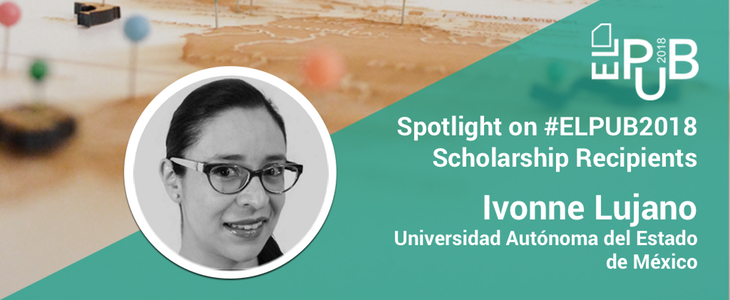
Over the next few weeks in the lead up to the ELPUB Conference, we will be featuring the #ELPUB2018 Travel Scholarship recipients on our blog. We would like to thank our Conference Partners – PLOS, OpenEdition, SPARC, FACETS Journal, UTSC’s Arts Culture and Media Department and Centre for Critical Development Studies, U of T Libraries, ACRL, Arcadia Fund, CARL, CRKN, Creative Commons, eLife, KULA Journal and Ubiquity Press – for making it possible to include more voices in the conversation.
In this post, we share a Question and Answer interview with Ivonne Lujano from the Universidad Autónoma del Estado de México. Ivonne is a co-author of the paper, “Open Science practices adopted by Latin American & Caribbean open access journals” to be presented at the ELPUB Conference.
What are your research interests and how do they fit in with the theme of the ELPUB conference (Connecting the Knowledge Commons: From Projects to Sustainable Infrastructure)?
My main research interest is open access journals publishing in Latin America, which is the main model to produce and disseminate quality science outputs in this region. Currently I am the ambassador of the Directory of Open Access Journals (DOAJ) in Latin America, which gives me the opportunity to collaborate with several universities and research centers, promoting best practice and transparency in journals. This is especially relevant because most of the Latin American journals are funded by public institutions, thus, it is essential to use resources (human, technological, etc.) with effectiveness, in order to widely benefit society.
What are some of the specific challenges within your region/country with regards to infrastructures for open access?
Open access journals in Latin America face several challenges related to the funding model because, in most of the cases, public resources are not enough to maintain digital platforms. Although there is a high number of journals that use Open Journal System (OJS) as their main publishing platform -which allow them to save resources- sometimes there is a lack of knowledge on how to keep it updated, to provide different formats of papers, to incorporate altmetrics and to reach quality in metadata, to provide data platforms, just to mention some of the more common challenges. There is also a necessity of infrastructure to analyze social impact of research in open access and last but not least, there is a prevailing challenge on human resources professionalization on publishing practices in the digital environment.
What do you hope are the outcomes of the ELPUB Conference?
I hope to listen and exchange experiences with colleagues from other regions to learn how these challenges are being faced and, based on that, to study how in Latin America we could take decisions to meet our own context and needs without copying models uncritically.
Any other comments you’d like to make?
I am interested in journals evaluation systems in Latin America, because I firmly believe that if we want to democratize the current scholarly communication environment, the mechanisms to determine quality of journals such as the more traditional metrics should be reviewed. Last year, with a colleague from Argentina, I published a paper on this issue; we hope our analysis contributes to improving national policies for journals.





